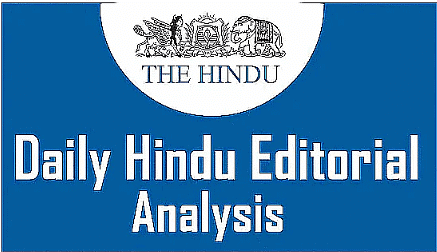UPSC Exam > UPSC Notes > Current Affairs & Hindu Analysis: Daily, Weekly & Monthly > The Hindu Editorial Analysis- 18th September 2023
The Hindu Editorial Analysis- 18th September 2023 | Current Affairs & Hindu Analysis: Daily, Weekly & Monthly - UPSC PDF Download

Crafting a new chapter in parliamentary conduct
Why in News?
The Union government of India has announced a special session of Parliament to be held in the newly constructed building.
- This session holds particular significance as it marks the first official use of the new parliamentary facility.
When does Parliament meet?
- Parliamentary system - The Constitution of India provides for a parliamentary form of government.
- Articles 74 and 75 -In the Centre and
- Articles 163 and 164- In the states.
- Ivor Jennings called the parliamentary system as ‘cabinet system’ because the cabinet is the nucleus of power in a parliamentary system.
- Sessions - When the Parliament meet for discussing various agenda and approving bills, motions with a scheduled meeting, it is called session.
- India’s Parliament has no fixed calendar of sittings.
- In 1955, a Lok Sabha committee had proposed a timetable for parliamentary sessions but was never implemented.
- The Parliament holds 3 sessions in a year.
- Budget session (February-May)
- Monsoon Session (July-August)
- Winter Session (November-December)
- Determining the sessions - The Cabinet Committee on Parliamentary Affairs determines the date and duration of parliamentary sessions.
- It currently has 10 Ministers, including those for Defence, Home, Finance, Agriculture, Tribal Affairs, Parliamentary Affairs, and Information and Broadcasting.
- The Law Minister and the Minister of State for External Affairs are special invitees to the Committee.
- The President is informed about the Committee’s decision, who then summons Members of Parliament to meet for the session.
Special Session of Parliament: An Overview
- A special session of Parliament refers to a unique meeting convened outside of the regular parliamentary sessions.
- The term “special session” is not explicitly mentioned in the Constitution of India.
- Its convening is carried out as per the provisions of Article 85(1) of the Constitution.
Procedure of calling such Session
- Article 85(1) of the Indian Constitution stipulates the procedure for summoning Parliament.
- This constitutional provision grants the President the authority to call Parliament into session, including special sessions, as deemed necessary.
- It says:
“The President shall from time to time summon each House of Parliament to meet at such time and place as he/she thinks fit, but six months shall not intervene between its last sitting in one session and the date appointed for its first sitting in the next session.”
Historical Context of Special Sessions
Special sessions of Parliament have varied in their focus and format over the years:
[A] Special Sessions with Debates:
- 2015: A special session commemorated Dr. B.R. Ambedkar’s 125th birth anniversary.
- 1997: Parliament convened to mark India’s 50th anniversary of independence.
- 1962: The agenda included a discussion on the India-China war situation.
[B] Midnight Special Sessions (Without Debates):
- 1972: A session was held to celebrate 25 years of India’s independence.
- 1992: A special session marked the 50th anniversary of the Quit India Movement.
- 2017: A session was convened to mark the rollout of the Goods and Services Tax (GST).
Lok Sabha and Rajya Sabha Meeting
- Pre independence- The Central Assembly met for a little more than 60 days a year.
- Post-independence- It increased to 120 days a year in the first 20 years after Independence. Since then, the sitting days of the national legislature have declined.
- Between 2002 and 2021, Lok Sabha averaged 67 working days.
- In 2022, 28 state Assemblies met for 21 days on average.
- Recommendations- Conference of presiding officers has recommended that Parliament should meet for more than 100 days.
- The National Commission to Review the Working of the Constitution set up in 2000 made a similar recommendation.
- Private member bill- Individual MPs have introduced private member Bills that stipulated increased sitting days for Parliament.
- Private member Bill in 2017 suggested that Parliament should meet for 4 sessions in a year, including a special session of 15 days for debating matters of urgent public importance.
- Lok Sabha committee 1955- It recommended that the Parliament would be in session for 8 months every year.
- International practice-The US Congress and parliaments of Canada, Germany, and the UK are in session throughout the year.
The document The Hindu Editorial Analysis- 18th September 2023 | Current Affairs & Hindu Analysis: Daily, Weekly & Monthly - UPSC is a part of the UPSC Course Current Affairs & Hindu Analysis: Daily, Weekly & Monthly.
All you need of UPSC at this link: UPSC
|
38 videos|5288 docs|1117 tests
|
Related Searches
















